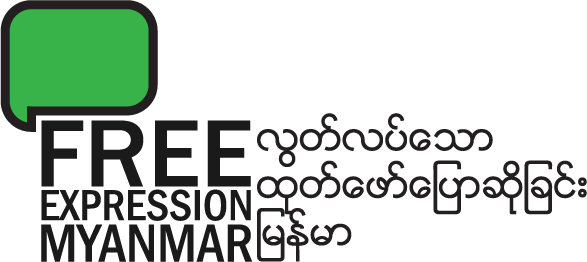UEC and State-controlled broadcasting undermine elections — ရွေးကောက်ပွဲကို ယုတ်လျော့စေသည့် ရွေးကောက်ပွဲကော်မရှင်နှင့် နိုင်ငံပိုင် ရုပ်သံထုတ်လွှင့်ရေးကဏ္ဍ
ပြည်ထောင်စု ရွေးကောက်ပွဲကော်မရှင် အနေဖြင့် အစိုးရ၏ မီဒီယာအပေါ်ထိန်းချုပ်ခြင်းကို အသုံးချပြီး အတိုက်အခံပါတီများအပေါ် ဆင်ဆာဖြတ်တောက်နေခြင်းကို ချက်ချင်း ရပ်တန့်ပေးရန် FEM က တိုက်တွန်းလိုက်သည်။ နိုင်ငံရေးပါတီများ၏ ရွေးကောက်ပွဲဆိုင်ရာရုပ်သံထုတ်လွှင့်မှုကို ကြားဝင်စွက်ဖက်ခြင်းသည် နိုင်ငံတကာ ဒီမိုကရေစီစံနှုန်းများကို ချိုးဖောက်သကဲ့သို့ မြန်မာနိုင်ငံ၏ လွတ်လပ်ပြီး တရားမျှတသောရွေးကောက်ပွဲတစ်ရပ် ဖြစ်ပေါ်လာစေရေးကိုလည်း ခြိမ်းခြောက်လျှက်ရှိသည်။
အမျိုးသားဒီမိုကရေစီအဖွဲ့ချုပ် (NLD) ပါတီသည် လွတ်လပ်သော ရုပ်သံမီဒီယာများ ပေါ်ပေါက်ရေးနှင့် လွတ်လပ် မျှတသော ရွေးကောက်ပွဲများ ဖြစ်လာစေရေးအတွက် ၂၀၁၅ ရွေးကောက်ပွဲ၌ (NLD ၏ ရွေးကောက်ပွဲ ကြေညာစာတမ်း၊ အခန်း ၄.၁၁.၃ နှင့် ၂.၄ တွင်) ကတိကဝတ်ပြုခဲ့သည်။ သို့သော် ရုပ်မြင်သံကြားနှင့် ရေဒီယိုလိုင်း အများစုသည် ယခုထက်တိုင်အောင် အစိုးရ၏ ထိန်းချုပ်ခံဖြစ်နေပြီး၊ ပရိသတ်ပြည်သူလူထုကို လွှမ်းမိုးထားကာ၊ အစိုးရကို မျက်နှာသာပေးပြီး ဘက်လိုက်ခြင်းတို့ လုပ်ဆောင်နေဆဲ ဖြစ်သောကြောင့် အာဏာရပါတီ NLD သည် အာဏာရပြီးနောက်နှင့် ၂၀၂၀ ခုနှစ်တိုင်အောင် ထိုကတိကဝတ်များကို ပျက်ကွက်နေခဲ့ပြီးဖြစ်သည်။
ပြီးခဲ့သည့် သီတင်းပတ်အတွင်း ပြည်ထောင်စုရွေးကောက်ပွဲကော်မရှင် (UEC) သည် အတိုက်အခံ နိုင်ငံရေးပါတီများအပေါ် အကြိမ်ကြိမ် ဆင်ဆာဖြတ်တောက်ခဲ့သည်။ နိုင်ငံရေးပါတီအားလုံးသည် Direct Access Programmes (DAP) ဟုခေါ်သည့် ရွေးကောက်ပွဲအောင်နိုင်ရေး မဲဆွယ်သည့် မိန့်ခွန်းဗီဒီယိုအတိုများကို နိုင်ငံပိုင်မီဒီယာမှတစ်ဆင့် ထုတ်လွှင့်ခွင့် ရသည်။ သို့သော် ဟောပြောမည့်မိန့်ခွန်းကို ရွေးကောက်ပွဲကော်မရှင်ထံ တင်ပြ၍ ကြိုတင်အတည်ပြုချက်ယူကြရသည်။ အတည်ပြုချက်မရပါက နိုင်ငံပိုင်ရုပ်သံလွှင့်မီဒီယာသည် ပါတီများ၏ DAP ဗီဒီယိုမိန့်ခွန်းကို မဲဆန္ဒရှင်များထံ ထုတ်လွှင့်ပေးမည် မဟုတ်ပေ။ ရွေးကောက်ပွဲကော်မရှင်သည် ဤကြိုတင်ခွင့်ပြုချက်တောင်းရန်လိုအပ်ချက်ကို အကြိမ်ကြိမ် အလွဲသုံးစား လုပ်ခဲ့သည်။ အနည်းဆုံး နိုင်ငံရေးပါတီလေးခုက ကော်မရှင်သည် ၎င်းတို့၏ DAP မိန့်ခွန်းပါ အကြောင်းအရာများကို ဖျက်ပေးရန် ညွှန်ကြားခဲ့သည်ဟု လူသိရှင်ကြား ထုတ်ပြောခဲ့သည်။ ပါတီအများအပြားသည် ၎င်းတို့ ပေးချင်သည့် သတင်းစကားအကြောင်းအရာများကို ဆင်ဆာအဖြတ်မခံလိုသည့်အတွက် အကျိုးဆက်ရလဒ်အနေဖြင့် DAP မဲဆွယ်မိန့်ခွန်းလွှင့်မည့်ကိစ္စကို ဖျက်သိမ်းခဲ့သည်။
ကိုဗစ် ၁၉ ကာလ၌ ပါတီများသည် အများပြည်သူကို မဲဆွယ်စည်းရုံးရာတွင် ပုံမှန်အတိုင်း တစ်အိမ်တက်တစ်အိမ်ဆင်းမဲဆွယ်ခြင်းနှင့် အများပြည်သူအကြား မဲဆွယ်ကမ်ပိန်းများ မလုပ်နိုင်တော့သည့်အတွက် DAP ဗီဒီယိုများသည် ဤကာလတွင် အလွန့်အလွန်ကို အရေးကြီးလှသည်။ ၂၀၂၀ ရွေးကောက်ပွဲတွင် DAP ဗီဒီယိုသည် လက်ရှိအစိုးရအပေါ် ဝေဖန်ချက်များနှင့် ၎င်းတို့၏ ရွေးကောက်ပွဲ ကတိကဝတ်ကို ချပြပြီး မဲဆန္ဒရှင်များနှင့် ဆက်သွယ်ရန် နိုင်ငံရေးပါတီများအတွက် အကောင်းဆုံး အခွင့်အလမ်းဖြစ်သည်။ မည်သည့်ပါတီ ၏ DAP ကို မဆို ကြားဝင်စွက်ဖက်ခြင်းသည် ထိုပါတီအပေါ် မဲဆန္ဒရှင်များ၏ နားလည်သဘောပေါက်မှုနှင့် ထင်မြင်ချက်ကို လမ်းကြောင်းလွဲသွားစေနိုင်သည့် ပြင်းထန်သော အန္တရာယ်ရှိသည်။
ထို့ကြောင့် နိုင်ငံတကာဒီမိုကရေစီစံနှုန်းများက DAP ကို ကြားဝင်စွက်ဖက်သည့် လုပ်ရပ်အများစုသည် နိုင်ငံရေးပါတီတစ်ခု၏ လွတ်လပ်စွာထုတ်ဖော်ပြောဆိုခွင့်ကိုသာမက မဲဆန္ဒရှင်များ၏ ရွေးကောက်ပွဲဆိုင်ရာ သတင်းအချက်အလက်သိရှိသိမ်းဆည်းဖြန့်ဝေပိုင်ခွင့်ကိုပါ ပြင်းပြင်းထန်ထန်ချိုးဖောက်မှု ဖြစ်ကြောင်း ယူဆသတ်မှတ်သည်။ ထိုချိုးဖောက်မှုများသည် စိုးရိမ်ရပြီး ရွေးကောက်ပွဲ၏ လွတ်လပ်မှု၊ တရားမျှတမှုတို့ကို သိသိသာသာ လျော့ကျစေသည်။
နိုင်ငံတကာဥပေဒအရ ခွင့်ပြု၍ရသည့် တစ်မျိုးတည်းသော ကြားဝင်စွက်ဖက်မှုမှာ DAP မိန့်ခွန်းပါ အကြောင်းအရာသည် ဒီမိုကရေစီနည်းကျသော တရားဥပဒေတစ်ရပ်နှင့်မညီသလို ကြီးကြီးမားမား ထိခိုက်နစ်နာမှု ဖြစ်စေနိုင်သောအခါမှ ဖြစ်သည်။ ဥပမာ မိန့်ခွန်းတွင် မဲဆန္ဒရှင်များကို ခွဲခြားဆက်ဆံရန် လှုံ့ဆော်ခြင်း၊ ပြစ်မှုကျူးလွန်ရန် အားပေးတိုက်တွန်းခြင်းမျိုး ဖြစ်သည်။ သို့သော် ရွေးကောက်ပွဲကော်မရှင်က ထောက်ပြခဲ့သည့် အကြောင်းအရာများသည် တရားဥပဒေနှင့်မညီခြင်း၊ ထိခိုက်နစ်နာမှု ဖြစ်စေခြင်းတို့ မရှိသည်မှာ ထင်ရှားလှသည်။ ရွေးကောက်ပွဲကော်မရှင်က တောင်းဆိုသည့်ကိစ္စများတွင် အခွန်နှင့်ပတ်သက်သည့် အကိုးအကားများ၊ “ဖိနှိပ်ခံ”ကဲ့သို့သော စကားရပ်နှင့် ကုလသမဂ္ဂ၏ ကလေးသူငယ်ဆိုင်ရာ အစီရင်ခံစာအကိုးအကားတို့ကို ဖယ်ရှားပေးရန် ပါဝင်သည်။ ဤသို့ရွေးကောက်ပွဲကော်မရှင်က ကဖယ်ရှားပေးရန်တောင်းဆိုသည့် အကြောင်းအရာများသည် ဒီမိုကရေစီစနစ်တွင် ကျိုးကြောင်းဆီလျော်သော အကြောင်းအရာမျိုးများသာဖြစ်ပြီး၊ ဒီမိုကရေစီစနစ် ကျင့်သုံးသည့် မည့်သည့်ရွေးကောက်ပွဲတွင်မဆို ပုံမှန်အကြောင်းအရာသာ ဖြစ်သည်။
ရွေးကောက်ပွဲကော်မရှင်က DAP များအပေါ် ယင်း၏ဆင်ဆာဖြတ်တောက်ရန် ဆုံးဖြတ်ချက်ကို ၂၀၁၀ ရွေးကောက်ပွဲဥပဒေနှင့် ညီညွှတ်သည်ဟု အကြောင်းပြခဲ့သည်။ ရွေးကောက်ပွဲကို သပိတ်မှောက်သည့် ကမ်ပိန်းများနှင့် ပတ်သက်ပြီး FEM မှ ယခင်က ထည့်သွင်းရေးသားခဲ့ဖူးသကဲ့သို့ ဤရွေးကောက်ပွဲဥပဒေတွင် အလွဲသုံးစားလုပ်နိုင်သည့် အလွန်အဓိပ္ပာယ်ဝေဝါးသော ပြဌာန်းချက်များ ထည့်သွင်းထားသည်။
သို့သော် ထိုသို့ အဓိပ္ပာယ်ဝေဝါးခြင်းများက ရွေးကောက်ပွဲကော်မရှင်အား ဆင်ဆာဖြတ်တောက်ပိုင်ခွင့်ကို မပေးပါ။ မြန်မာနိုင်ငံ၏ ဖွဲ့စည်းပုံအခြေခံဥပဒေ ပုဒ်မ ၃၅၄ တွင် နိုင်ငံရေးပါတီများ၏ လွတ်လပ်စွာထုတ်ဖော်ပြောဆိုခွင့်ကို ကာကွယ်ပေးထားသည်။ ထို့ကြောင့် DAP များသည် ဖွဲ့စည်းပုံအခြေခံဥပဒေက ကာကွယ်ပေးထားသော အရာဖြစ်သည်။ “တရားဥပဒေ စိုးမိုးရေး” အခြေခံသဘောတရားက ဆိုလိုသည်မှာ အကယ်၍ ရွေးကောက်ပွဲဥပဒေ၏ တစ်နေရာရာတွင် ပြဌာန်းချက် အဓိပ္ပာယ်ဝေဝါးနေလျှင် ရွေးကောက်ပွဲကော်မရှင် အပါအဝင် အစိုးရက ဖွဲ့စည်းပုံအခြေခံဥပဒေနှင့်အညီ အနက်အဓိပ္ပာယ် ပြန်ပေးရမည် ဖြစ်သည်။ ဖွဲ့စည်းပုံအခြေခံဥပဒေသည် ဥပဒေအားလုံး၏ အထက်တွင် ရှိ၍ ရွေးကောက်ပွဲဥပဒေအပါအဝင် ဥပဒေအားလုံးသည် ဖွဲ့စည်းပုံအခြေခံဥပဒေနှင့် အညီ ဖြစ်ရမည်ဖြစ်သည်။
ရွေးကောက်ပွဲကော်မရှင်အနေဖြင့် DAP များကို ဆင်ဆာဖြတ်တောက်နေခြင်းကို ချက်ချင်းရပ်တန့်ရန်နှင့် မြန်မာနိုင်ငံ ဖွဲ့စည်းပုံအခြေခံဥပဒေက ကာကွယ်ပေးထားသော နိုင်ငံရေးပါတီများ၏ လွတ်လပ်စွာထုတ်ဖော်ပြောဆိုခွင့်ကို ကာကွယ်ပေးရန် FEM က တောင်းဆိုပါသည်။ DAP အားလုံးကိုလည်း ကြားဝင်စွက်ဖက်တားဆီးမှု မရှိဘဲ ထုတ်လွှင့်ပေးသင့်သည်။
ထို့အပြင် နိုင်ငံရေးပါတီအားလုံးအနေဖြင့် မီဒီယာသည် အစိုးရ၏ထိန်းချုပ်ခံ ဖြစ်နေခြင်းက ယင်းတို့အပေါ် မည်ကဲ့သို့ အလွဲသုံးစားလုပ်နိုင်ကြောင်းကို အသိအမှတ်ပြုနားလည်ရန်နှင့် ရုပ်မြင်သံကြားနှင့် ရေဒီယိုများကို အစိုးရက တိုက်ရိုက်ဖြစ်စေ၊ တစ်ဆင့်ခံဖြစ်စေ ထိန်းချုပ်နေခြင်း အဆုံးသတ်စေရေးအတွက် ရွေးကောက်ပွဲ ကတိကဝတ်ပြုရန် FEM က တိုက်တွန်းလိုက်ပါသည်။
FEM urges the UEC to immediately stop using State control of the media to censor opposition parties. Interfering in party broadcasts infringes international democratic standards and threatens Myanmar’s free and fair elections.
The National League for Democracy (NLD) committed in the 2015 elections to create free broadcasters and free and fair elections (NLD manifesto, Section 4.xi.3 and 2.4). By 2020, the NLD has failed to implement these commitments as the majority of television and radio channels are still controlled by the State, dominate public audiences, and are biased in favour of the government.
Over the past week, the Union Election Commission (UEC) has repeatedly censored opposition political parties. All political parties have a right to play short election campaign videos, called “Direct Access Programmes” (DAP), on State media but must get prior approval of their manuscripts from the UEC. Without UEC approval, the State media will not broadcast the party’s DAP to the electorate. This requirement has repeatedly been misused by the UEC; at least four parties have complained publicly that the UEC has ordered them to remove content from their DAPs. Several parties have cancelled their DAPs as a result because they do not wish their messages to be censored.
DAPs are extraordinarily important during COVID-19 because parties cannot conduct normal house-to-house and public campaigning. In the 2020 elections, DAPs are the parties’ best opportunity to communicate to the electorate both their criticism of the current government and their own commitments too. Any interference in any party’s DAP seriously risks skewing the electorate’s understanding and opinion of that party.
Therefore, international democratic standards regard most interference in DAPs to be a serious violation of both a political party’s right to freedom of expression and the electorate’s right to election information. These violations are grave and substantially undermine the freedom and fairness of the elections overall.
The only interference permissible under international law is if the content of a DAP is both unlawful and also likely to create considerable harm. For example, if the DAP incites discrimination or urges the electorate to commit a crime. However, the content highlighted by the UEC is clearly not unlawful or harmful. The UEC’s demands include removing references to taxes, words like “repressed”, or references to UN reports on children. This content is both legitimate and indeed normal in any democratic election.
The UEC has justified its decisions to censor DAPs on Myanmar’s 2010 Election Law. The Election Law includes extremely vague provisions that can be misused, as FEM has previously highlighted regarding election boycott campaigns.
However, this vagueness does not give the UEC the right to censor. Myanmar’s Constitution, Article 354, protects political parties’ right to freedom of expression. DAPs are therefore constitutionally protected. The principle of “rule of law” means that if any part of the Election Law is vague, the State – including the UEC – must interpret the Law under the Constitution. The Constitution sits above all laws, and all laws – including the Election Law – must abide by it.
FEM calls on the UEC to immediately stop censoring DAPs and to instead protect the political parties’ right to freedom of expression as protected under the Myanmar Constitution. All DAPs should be broadcast without interference.
FEM also urges all political parties to recognise how State control of the media can be misused against them, and to commit to ending all direct and indirect State control of television and radio channels.
